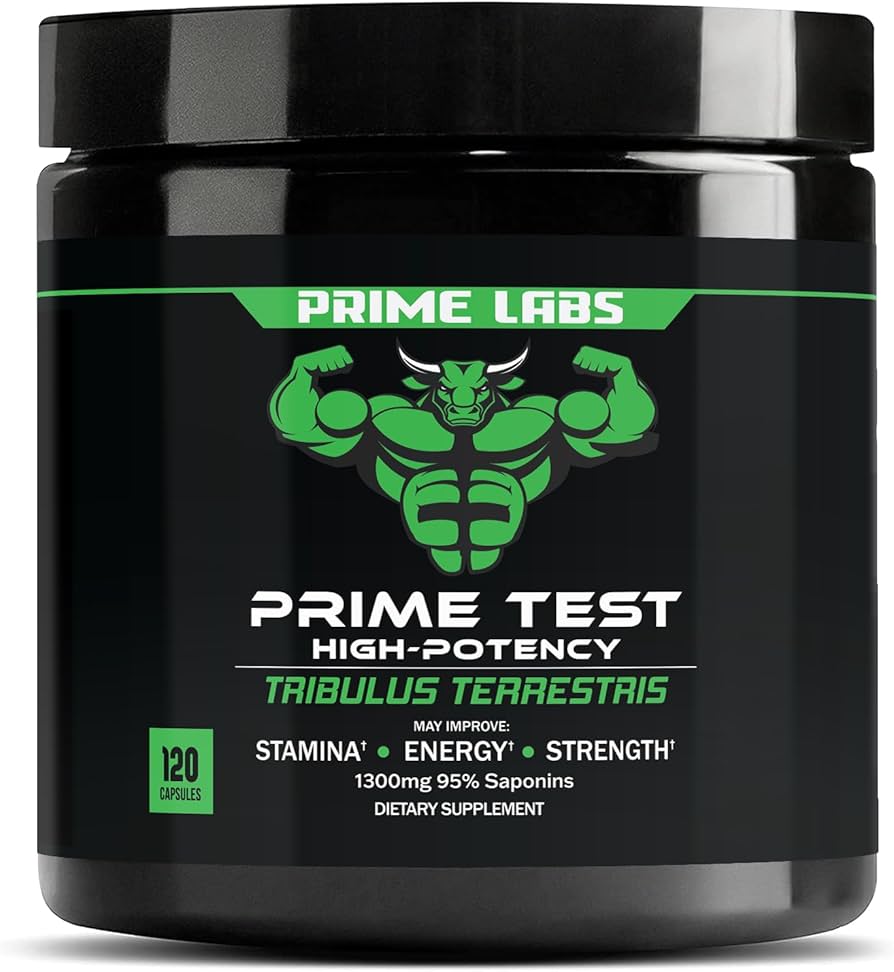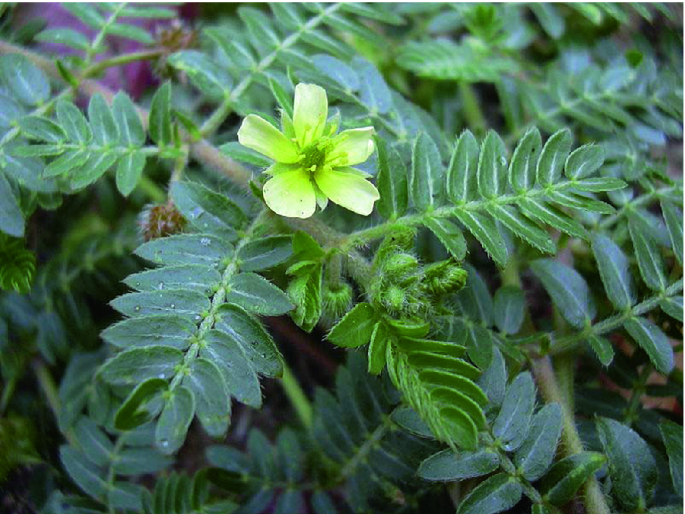Prime Test – High Potency containing ingredients of Tribulus Terrestris (T. terrestris), a plant belonging to the Zygophyllaceae family, has been traditionally used across various cultures for its medicinal properties. Commonly known as puncture vine or Gokshura in Ayurveda, this plant is widely known for its potential benefits in enhancing physical performance, boosting stamina, and improving overall strength. But what does the research say about these claims? Let’s dive into the scientific findings.
What Is Tribulus terrestris?
Tribulus terrestris is an annual herb that grows in tropical and subtropical regions. Known by various names such as Gokshura in Ayurveda and puncture vine, the plant contains bioactive compounds, particularly steroidal saponins like protodioscin, believed to contribute to its effects on health and performance.

Traditional and Modern Uses
Traditionally, T. terrestris has been used in Chinese, Indian, and Mediterranean medicine for treating ailments such as sexual dysfunction, kidney disorders, and cardiovascular issues. Its purported ability to enhance testosterone levels has made it popular among athletes and fitness enthusiasts aiming to improve muscle mass and physical endurance.
Modern applications extend to dietary supplements aimed at improving physical performance and recovery. The presence of steroidal saponins has been linked to testosterone-boosting effects, although the exact mechanisms remain under investigation. Additionally, its anti-inflammatory and antioxidant properties suggest broader health benefits.
Key Studies on Strength and Stamina
Study on CrossFit® Performance by Diego Fernández-Lázaro et al. (2021)
This randomized, single-blind, placebo-controlled study investigated the effects of six weeks of T. terrestris supplementation on CrossFit® performance. Thirty male athletes received either 770 mg of T. terrestris daily or a placebo. The study assessed body composition, hormonal response, perceived exertion, and performance in standardized workouts.
Findings: The study observed no significant improvements in body composition or most performance metrics. However, a modest increase in testosterone levels and enhanced recovery post-exercise were noted. The authors concluded that while T. terrestris might support recovery, its role in directly improving strength or stamina requires further exploration.
The inclusion of CrossFit® athletes is particularly relevant, as their high-intensity training regimens provide a rigorous test of any ergogenic supplement’s efficacy. Despite the limited improvements observed, the study highlighted its potential in post-exercise hormonal recovery.
Systematic Review on Physically Active Males by Diego Fernández-Lázaro et al. (2022)
This systematic review analyzed multiple studies on the effects of T. terrestris on sports biomarkers in active males. The review highlighted moderate improvements in lipid profiles and hormonal markers but found limited evidence supporting significant benefits for muscle damage recovery or strength gains.
The review also underscored the variability in study designs, dosages, and participant profiles, which complicates the interpretation of results. While some trials reported benefits such as reduced muscle damage and improved lipid metabolism, others found no measurable effects on performance.
Study on Animal Models by Zhu et al. (2017)
Research on rats demonstrated that T. terrestris supplementation improved testosterone levels and physical performance compared to controls. These effects were attributed to the plant’s steroidal saponins, which might stimulate endogenous testosterone production.
Key Insight: Animal studies often serve as a precursor to human trials, and the promising results in this study suggest potential mechanisms that could be explored further. However, the translation of findings from animal models to humans remains a challenge due to physiological differences
Chemical Constituents and Biological Properties by Semerdjieva and Zheljazkov (2019)
This review emphasized the variability in the effects of T. terrestris based on extraction methods and saponin concentration. While some preparations improved muscle tone, others failed to produce consistent results. The authors suggested that differences in plant preparation could explain these disparities.
Extraction Methods: The methods used to extract bioactive compounds from this plant significantly influence the final product’s efficacy. Ethanol and methanol extractions are commonly used to isolate saponins, which are believed to drive most of the plant’s biological activities.
Promising Phytopharmacology and Health Benefits by Muhammad Saeed et al. (2024)
This recent review explored the broad therapeutic potential of T. terrestris, the main ingredient of Prime Test – High Potency, highlighting its applications in sports and general health. The authors noted its testosterone-boosting properties and its potential to regulate blood pressure, reduce inflammation, and enhance muscle recovery. However, they also emphasized the need for standardized methodologies in future research.
Clinical Implications: The review highlighted the need for long-term clinical trials to establish the safety and efficacy of T. terrestris supplements. The potential for its inclusion in sports nutrition and general health regimens remains promising but requires more robust evidence.

Mechanisms of Action
The bioactive compounds in T. terrestris, particularly saponins like protodioscin, are believed to stimulate luteinizing hormone (LH) production. This hormone promotes testosterone synthesis, contributing to muscle growth and improved stamina. Additionally, its antioxidant and anti-inflammatory properties might aid in faster recovery and reduced oxidative stress during intense physical activities.
Antioxidant Activity: The plant’s ability to neutralize reactive oxygen species (ROS) helps reduce muscle damage and supports recovery after intense exercise.
Inflammation Reduction: By downregulating pro-inflammatory markers such as TNF-α and IL-1β, T. terrestris may help mitigate the effects of chronic inflammation associated with strenuous physical activity.
Benefits Beyond Strength and Stamina
T. terrestris offers a range of health benefits that extend beyond athletic performance. According to Abdullah Khalid et al. (2022), the plant’s extracts exhibit strong antioxidant, anti-inflammatory, and antidiabetic properties. Their study revealed that methanolic root extracts could inhibit α-glucosidase activity by 50.16% and significantly downregulate inflammatory markers such as TNF-α and IL-1β in HepG2 liver cancer cells. This suggests a broader application of T. terrestris in managing chronic diseases
Potential Applications: The anti-inflammatory and antioxidant properties make T. terrestris a candidate for developing treatments for diabetes, cancer, and cardiovascular diseases. Further research could expand its therapeutic uses.
Limitations and Controversies
Despite its popularity, not all studies agree on the efficacy of T. terrestris in enhancing physical performance. Several clinical trials have failed to demonstrate significant improvements in strength or stamina, raising questions about its overall utility as a performance enhancer. Factors such as individual variability, dosage, and preparation methods could influence outcomes.
Moreover, Semerdjieva and Zheljazkov (2019) highlighted inconsistencies in the study methodologies. Differences in extraction techniques, plant parts used, and saponin concentrations contribute to the variability in results. This underscores the need for standardized protocols to better evaluate the plant’s efficacy.
Practical Recommendations for Use
For individuals considering Prime Test – High Potency T. terrestris supplementation, it is essential to select high-quality products with standardized saponin content. Dosages in clinical studies typically range from 500 to 1000 mg per day. Consulting a healthcare provider is recommended, especially for those with underlying health conditions.
Usage Tips: Look for products that specify saponin concentration and adhere to good manufacturing practices. Avoid supplements with unverified claims or those lacking third-party testing.
Conclusion
Prime Test – High Potency Tribulus terrestris has shown promise in improving recovery, hormonal balance, and general health. However, its direct effects on strength and stamina remain inconclusive. While the plant’s bioactive compounds offer potential benefits, further research with standardized methodologies is necessary to confirm its role as a performance enhancer.
Whether you’re an athlete or a fitness enthusiast, understanding the limitations and potential of supplements like T. terrestris can help you make informed decisions. Always prioritize evidence-based approaches and consult professionals before incorporating new supplements into your routine.
